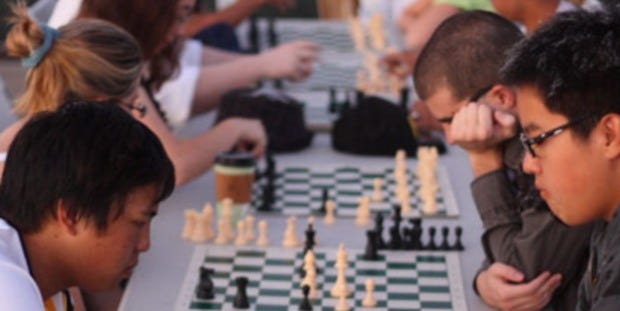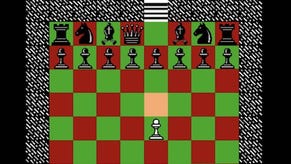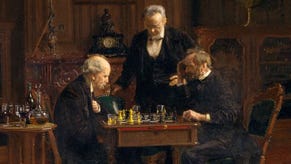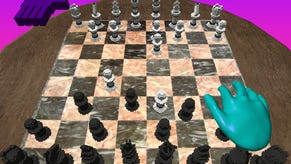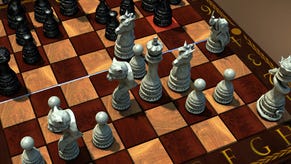Cardboard Children - Are Games Dumbing Down?
Are they!?
Hello youse.
A man called Robert Florence gets on a train to London at 2pm, leaving from Glasgow. If the train is travelling at 80 miles per hour, and the distance to London is 860 miles, how clear is it that Robert doesn’t know how far it is to London? But what I really want to know is: How tall is Robert when he’s on that train, if he’s sitting down? And how tall is he if he’s crawling around on the floor, crying? And are board games dumbing down?
ARE GAMES DUMBING DOWN?
Of course, it doesn’t matter whether Robert is sitting down or crawling around crying as he reflects on bad career choices. He is always the same height – 6 foot 4. And he is always extremely muscular and powerful. But why is he on that train to London in the first place?
Well, he’s going to give a talk about games to the Gaming Society Of Gentlemen And Ladies Of The Thankfully Deceased British Empire (est. 1977) and he has chosen this as his topic: ARE GAMES DUMBING DOWN?
The title of this talk is the same as the title of a column he wrote in 2016, for the high-brow gaming website Rock, Paper, Shotgun. In that column he wrote about a talk he was about to give to the Gaming Society Of Gentlemen And Ladies Of The Thankfully Deceased British Empire (est. 1977). That talk, and that column, are the subject of this column (and also the subject of a talk later this year, in London).
Robert started by making the point that board gaming was experiencing a boom period. An unprecedented golden age of gaming had seen hundreds and hundreds of fine board games being released every single year, and the community around board gaming had grown and spread into mainstream culture like never before.
And while he stated that this was a positive thing, he noted that with the growth of board gaming he had also noticed a shift in the nature of games being published.
(It must be noted that Robert Florence did not deliver this talk or write this column in a confrontational manner. His tone was light and good-humoured throughout.)
“It is 1985 and I am 8 years old. And on my living room table is Trivial Pursuit. The game is not adored by our family, nor is it even liked. It just is. It is what board games are. Everyone has this game by now. Every table in every living room has a copy of Trivial Pursuit right there, ready for some post-dinner play. So what is Trivial Pursuit? It is a game that tests your general knowledge, a game that will most likely be won by the most well-read person in the room. That person won’t win every single time, however – there is an outrageously unfair balancing system in play, the random factor of the dice, there to slow the progress of the family brainbox and offer extra catch-up opportunities to the less knowledgeable.
Trivial Pursuit is not a good game. But there was a time when there was a great deal of importance placed in how smart people were, on the most superficial of levels. Quiz shows on TV weren’t all about choosing the right box – they were about answering some ridiculously difficult questions. And there was a breed of board games that made a priority of the appearance of intelligence. That’s why we all used to pretend to have fun while answering questions about geography. Being that kind of smart used to matter.
Chess is a remarkably unforgiving abstract board game that isn’t particularly easy to learn and is almost impossible to master. It isn’t even a particularly fair game, with its reliance upon incredible feats of memory. It’s not accessible to new players – a chess player with even just a little more experience will dismantle a newcomer without fail. Is Chess fun? Perhaps only a little. And yet – and yet – chess might very well be in your home right now. And in your neighbour’s home. Chess is in the foyer of many a hotel. Chess is a default board game shipping with your new computer, your new phone. Why?
Purely because of tradition. Chess is the game intelligent people would play, and so we would play it too. Because we once cherished feats of intellect, even in games.
But look what we’re playing now. Look at the vast array of games we play now.
New games, constantly, many of them with very similar base mechanisms, but many more with new twists. We use terms like “Worker Placement” and “Area Control” to describe how certain games are played. With enough experience, some games almost initiate a kind of muscle memory in us, and we fall into readily understood patterns. We roll dice. We build decks. We build our machine. We push our luck. We negotiate. Rule books used to be two page pamphlets, readily ignored and house ruled. These days rule books can be thick and long, and the best rule books are to be respected.
These smart games we used to play, like MindTrap, with its logic puzzles and mathy questions, or Mastermind, with its mindless systematic code-cracking, were for people who didn’t play board games, and so they were for almost everyone. We don’t need those games anymore.
Games are not dumbing down. Indeed, we are smartening up. We don’t need to prove we’re smart by answering a question about the Grand Canyon or Van Gogh. We are a generation that is literate in the actual design of games. We can read mechanics, and play within them, using our smarts to improve and stretch our own performance within those boundaries. We understand how a set of mechanics can tell a story, and we can be imaginative and creative within that space. And, most importantly, we can tell a good game from bad.”
With this, Robert Florence set fire to a chess board, and was lynched by the audience. He really didn’t like chess. He was terrible at it.
Maybe he was stupid.
